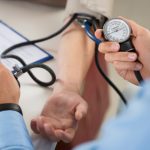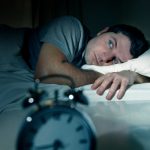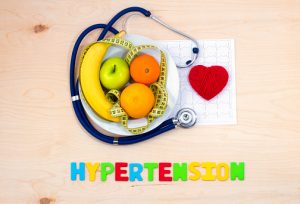Does insomnia, a lack of sleep, increase hypertension?
When it comes to high blood pressure – or hypertension – there are many factors that come into play: Diet, weight, smoking and alcohol use can all be attributed to your rising blood pressure.
Advertisement
In fact, lack of sleep is also a factor. Getting a good night’s rest not only determines your energy level the next day, but plays a large role in hypertension.
Blood pressure is the amount of blood pumped from your heart against blood vessels. This process is vital for blood flow, as well as carrying oxygen and nutrients. Hypertension refers to an excessive amount of blood flow being pushed from the heart.
Blood pressure out of control?
 Think of a garden hose and the water flowing through it. When the water pressure is normal, the water comes out smooth and controlled. But if you continue to turn the knob and water starts gushing out more rapidly, the hose is now under a lot of stress and becomes less controllable.
Think of a garden hose and the water flowing through it. When the water pressure is normal, the water comes out smooth and controlled. But if you continue to turn the knob and water starts gushing out more rapidly, the hose is now under a lot of stress and becomes less controllable.
This is similar to your blood vessels and your blood flow. High blood pressure is not only damaging to your blood vessels, but it’s also bad for your overall health. Hypertension generally worsens with age, but simple steps can keep it within normal levels. Having trouble keeping yours under control? If you’re doing all the right things to keep your blood pressure down, it may be your sleeping patterns that are hindering your success.
Link between insomnia and hypertension
Lack of sleep and hypertension has been well studied and documented in recent years. In one study by the American Heart Association, poor sleep was associated with resistant hypertension. This form of hypertension does not respond to medications, making it hard to treat. What the researchers did find was that the study participants got, on average, six hours of low-quality sleep. Although the time may seem average, they did not get quality sleep.
Additional research conducted in Italy confirmed the notion that poor sleep is related to resistant hypertension. In their study, participants once again experienced poor quality sleep and had trouble falling asleep. The study defines resistant hypertension as 140/90 mm Hg while taking medication.
In the journal Sleep Medicine, research surrounding the link between poor sleep and hypertension revealed that the less amount of sleep you get, the more likely you are to develop high blood pressure.
Further, research in Hypertension showed that those with low slow wave sleep (SWS) were at higher risk for hypertension. SWS is a deeper stage of sleep, harder to be woken from or disturbed. The research showed that men with low SWS were more likely to develop hypertension. Not experiencing SWS means that the quality of sleep diminishes as you are constantly in a light sleep that can be disrupted easily.
How lack of sleep quality increases risk of hypertension
 When we sleep, our body regulates stress within the blood, which in turn keeps our nervous system healthy. Lack of sleep causes hypertension when we get poor quality sleep because our bodies cannot regulate our stress.
When we sleep, our body regulates stress within the blood, which in turn keeps our nervous system healthy. Lack of sleep causes hypertension when we get poor quality sleep because our bodies cannot regulate our stress.
In studies of insomnia that causes hypertension, study participants experienced less than six hours of sleep. Seven to eight hours of quality sleep are optimal in preventing a lack of sleep and hypertension. If you can’t manage to get a good night’s rest, other issues may be working against you.
As research in Hypertension suggested, obesity also plays a factor in lack of sleep and hypertension. Those in the study who experienced reduced SWS were also obese, making weight a factor. Obesity also puts you at a higher risk for sleep apnea, which can cause poor sleep.
The point is, when you can’t sleep, your body becomes stressed. Stress in the body is controlled by the adrenal glands – located right at the top of your kidneys. The adrenal glands release cortisol as a response to stress. When we get poor sleep, cortisol is increased; the more you don’t sleep, the more cortisol enters the body and cannot be released. This can lead to insomnia, which causes hypertension, and a viscous cycle of high stress and no sleep. If you’ve experienced this, you’ll know how exhausting it truly is…
Improve sleep and lower your blood pressure
Lack of sleep doesn’t just cause hypertension; there are many other poor sleep effects that you may experience. Poor sleep affects mental clarity, libido, energy, mental health, aging skin, weight and even judgment. With all these negative outcomes from poor sleep, it’s important to try to get as much high quality sleep as you can.
There are many ways you can improve your quality of sleep and ward off hypertension. For starters, examine any underlying causes that may be disrupting your sleep. Are you stressed? Do you suffer from sleep apnea? These are viable questions to ask to get to the root of your sleeping problems.
There are good strategies to improve your sleep and fight poor sleep effects, such as:
 Exercise – exercise helps to normalize blood sugar and blood pressure levels. Exercise can also help you fall asleep faster, but ensure you’re not exercising right before bed as it may promote energy, causing you to stay wide awake.
Exercise – exercise helps to normalize blood sugar and blood pressure levels. Exercise can also help you fall asleep faster, but ensure you’re not exercising right before bed as it may promote energy, causing you to stay wide awake.- Diet – diet also plays a large role in quality of sleep and combatting hypertension. A low-sodium diet filled with essential nutrients will fuel your body and nourish it to work its best. You may also want to avoid stimulants like caffeine, as it won’t just keep you up, but can make your existing stress even worse.
- Stress – stress is bad for hypertension. If you’re overly stressed, you’ll not only have poor sleep, but it can lead to insomnia and hypertension. Reducing stress is vital for overall good health, along with exercise and diet. Meditation is also a viable solution and seeking therapy can help improve your mental health.
- A pre-existing medical diagnosis – if you have a pre-existing medical diagnosis, like sleep apnea, which keeps you awake, ensure you are taking the right path for treatment. A continuous positive airway pressure therapy (CPAP) machine can help you breathe and therefore stay asleep longer.
These tips can help you get back to high-quality sleep, which makes you feel energized and prevents the lack of sleep that causes hypertension.
You know sleep is important, so wouldn’t you want to try to get the best possible night’s rest naturally? Lack of sleep causing hypertension is a serious problem, so if you’ve been noticing that your eight hours a night has dropped down, or you’re waking up exhausted, it’s time to make sleep a priority for the well-being of your heart.
Related Reading:
Insomnia treatments and behavioral therapies to improve sleep
Advertisement
Occasional sleep problems can occur for many people, as many as 25 percent of Americans report having them. One of the most common sleep problems is insomnia, which is having trouble falling asleep or staying asleep during the night. Continue reading…
Persistent insomnia and loss of emotional regulation
Insomnia is a sleep disorder which makes it difficult to fall or stay asleep. It doesn’t matter how tired a person is, if they have insomnia, they simply cannot sleep. Lack of emotional regulation has been shown to lead to insomnia, this according to new findings. Continue reading…

